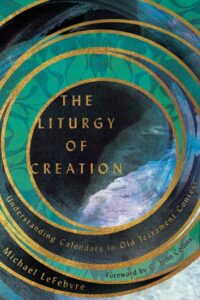Caldwell, ID. Jeff Bilbro’s recently published book, Reading the Times, offers a thoughtful challenge to those of us who have allowed the latest outrage cycle to loom too large in our sense of what is timely and important. In the words of Thoreau, he calls us to “Read not the Times, Read the Eternities.” Easier said than done, but Jeff offers sound advice for taking up the task with joy and diligence.
 Michael LeFebvre’s recent The Liturgy of Creation: Understanding Calendars in Old Testament Context is specifically an exploration of the significance of calendars in the Old Testament but is similarly oriented towards those who desire to be more grounded in the Christian vision of redemptive time rather than the other cycles that constantly demand our allegiance and attention. In the context of the calendars for holidays, feasts, and Sabbath observance in Leviticus, LeFebvre argues that we need to attend to the creation account in Genesis as a calendar for shaping the sacred rhythm of labor and worship.
Michael LeFebvre’s recent The Liturgy of Creation: Understanding Calendars in Old Testament Context is specifically an exploration of the significance of calendars in the Old Testament but is similarly oriented towards those who desire to be more grounded in the Christian vision of redemptive time rather than the other cycles that constantly demand our allegiance and attention. In the context of the calendars for holidays, feasts, and Sabbath observance in Leviticus, LeFebvre argues that we need to attend to the creation account in Genesis as a calendar for shaping the sacred rhythm of labor and worship.
LeFebvre is a presbyterian minister living in Indianapolis, Indiana, and a fellow with the Center for Pastor Theologians.
Stewart: One of the key points you make is that we have let the creation debates over Genesis demand too much of our attention in relation to other insights we might learn from Genesis. While it is certainly understandable that something as grand as an account of the creation of the world would demand most of the study and debate, what do we miss when we don’t listen for other themes in the book?
LeFebvre: One could argue that the incarnation is, metaphysically, the most mind-boggling aspect of the life of Jesus. Other events like the cross and resurrection are amazing displays of God’s love, but the union of full deity and full humanity is the miracle we cannot get our heads around. The incarnation is, arguably, the greatest miracle of the Jesus narratives. Yet no one would suggest that we devote the majority of our study of the Gospels on that event while giving little attention to the rest. On the contrary, the fact that such a mind-boggling beginning opens the story indicates that the story that follows is really, really important. The same is true of the grand miracle of creation that introduces the vitally important book of Genesis. In fact, while the creation account shows us the majesty and grace of God in his intent toward humanity, it is only in the stories after Adam’s Fall that we discover just how deep and persevering that grace of God is for us. The creation sets the stage, but one must give attention to the whole story of the book.
Stewart: I don’t recall that you used C.S. Lewis’s term “chronological snobbery” in the book, but it came to mind as I was reading. How has chronological snobbery led us astray in our readings of Genesis?
LeFebvre: I suppose there are ditches on either side of that road. On the one hand, “chronological snobbery” can lead modern readers to look down on how primitive the Old Testament writers were in their methods of timekeeping and farming and so forth. Many commit chronological snobbery today when they squint at these strange ways of defining months by watching the moon and dismiss the value of such ancient texts for the complexities of life today. But there is another side of that problem which, to me, seems a greater risk. After all, the chronological snobbery that looks down on the ancient texts is generally most prominent among unbelievers. But there can be, among believers, a reaction to chronological snobbery that is especially damaging.
We can over-react to the chronological snobbery of modern elites when we try to “defend” the wisdom of the Old Testament writers by showing how ancient Hebrews allegedly already knew things that modern science is “catching up with.” That latter danger is the one I think creates the most confusion about the Genesis texts. Our culture today places so much reverence on science, that it is tempting to try to prove that the Bible deserves reverence by showing how it meets and surpasses the wisdom of the scientific elites. That effort is a reaction against chronological snobbery which is well-intended but misdirected. The Scriptures do deserve reverence, and the desire to show that is noble. But, as the Apostle Paul warned the Corinthians, God does not try to impress the Greeks with the kind of philosophical wisdom they look for. Instead, He delights to use the simple to confound the wise. While we must never look down on the ancient Hebrews with chronological snobbery, we also ought to relish in the fact that God loved them enough to communicate his grace to them within the confines of what was, indeed, a more primitive understanding of the world. And we can benefit not only from reading the Scriptures through their lenses, but in the great lovingkindness of the God who has chosen to make his word accessible to his people in every age.
Stewart: You find in the creation account from Genesis and Leviticus’ laws for the Sabbath and the annual pattern of worship festivals an arrangement for a good and orderly society. The festival calendar in Leviticus in particular provides a “national metronome” that encourages risk spreading among households and “labor optimization for national fruitfulness” (38-39). It is not hard to see how this pattern of work and rest mapped onto the agrarian societies that received these Scriptures, even if the ideal was not always met. Is there any way for us to recover the wisdom of this rhythm in our digital world? Do you see a way to maintain the religious dimensions of this calendar without connection to agricultural necessity?
LeFebvre: In the Pentateuch, the Sabbath week (in Genesis 1) is the only calendar that is introduced for universal application. The rest of the Torah’s calendars are specifically identified with the people of Israel settling in the land of Canaan. The Sabbath week is what provides a foundational cadence of labor and worship for all peoples in all parts of the world, whether agrarian or industrial or part of an information economy. The other layers of Israel’s calendar were strictly tied to the seasonal patterns and agrarian economy of that specific land. From Israel’s model calendar, other societies (to the extent that they fear God as a society) can learn to structure their own native calendars to honor God. But every land would have its own calendar to accommodate its own economic cadences. It would be up to the civil governments of various societies to establish coherence and reverence for God in each nation’s calendar. But the Sabbath week remains the divinely appointed, universal calendar that can unify the whole of humanity—despite each land’s unique holidays—around a shared, fundamental cadence of labor and worship.
Stewart: The sabbath has enjoyed something of a renaissance in some circles, as you note in your book. What can Christians do to help others see the joy and wisdom in sabbath practices?
LeFebvre: There are a couple challenges we face when promoting sabbath observance. First, past generations have pushed the sabbath as a day of “don’ts.” It is true, of course, that the fourth commandment introduces the day with a list of “don’ts”: “don’t do any work” and “don’t require any work from your household” on the sabbath. But the purpose of those don’ts is positive. The call not to do work is to enable rest and joy. It is a day for fellowship, centrally fellowship with God (worship) and also fellowship with one another. Those are positive, joyful purposes. However, we have often focused so much energy on figuring out precisely what that word “labor” includes, and what kinds of activities are restricted from the day, we have become like the pharisees who fascinated over delineating the wording of laws so finely we lose sight of the law itself. We need to rediscover and promote the sabbath as a day for fellowship and refreshment with God (that is worship) and with one another.
A second challenge we face when promoting the sabbath is the modern two-day weekend. We have an unusual (and pretty cool!) tradition in modern western culture of giving everyone two days off on the weekend. That means we have Saturday to do whatever we want, and then we also have Sunday as the Lord’s Day. The two day weekend is great, and I have no interest in seeing Saturdays surrendered back to the company. Historically, however, people labored at their jobs six days. And it required a command of God (who pulled rank over all kings and landlords and clan patriarchs) to guarantee that everyone received their day off. That automatically made the sabbath a joy. Now that folk get a Saturday free-for-all, it takes the edge off the specialness of Sunday off. I don’t think there is anything we need to do about that. Saturdays are pretty great. But, it does create a challenge promoting the sabbath today that past generations did not face. It is helpful to recognize that, and then to continue to promote the sabbath as the weekend date for spiritual refreshment and divine fellowship.
Stewart: You highlight the difference between the ancient convention of marking time through event sequencing rather than through timeline dating. I find it very hard to imagine human experience without the background of universal timeline dating. What do people miss when they read the Bible without working back into a world in which something as basic as time is experienced in a very different way? Do you have any insights for how to help people better understand how to do that?
LeFebvre: God never intended for us to study the Bible individualistically. The Bible has always been the property of the whole community of faith. We have always needed priests, Levites, prophets, elders, Apostles, teachers, and pastors to provide instruction. Jesus also promised that he would send the Holy Spirit to guide us, as a church, in that process of study and learning. That means, on the one hand, that we should seek the help of theologians and scholars who assist us in our study of the text. That includes insights into period cultural perspectives that we would never identify by ourselves.
On the other hand, we can also have confidence that the Holy Spirit is governing the whole process, and that he is able to ensure each of God’s people receive as much light as they need without worrying about all the things we might yet be missing. Consider, for example, the lack of access which the Early Church Fathers had to so much linguistic and cultural insight we now take for granted. We can look back at Early Church exegesis and be critical of many things that we are confident they got wrong, and that we have perspective to understand better. However, we also can be amazed at how much they got right of what is most important. The Holy Spirit guides and guards our study through the ages, and he allows us to grow and improve in our understanding in some aspects of Scripture, and he will allow generations after us to correct areas where we get things wrong. Bible study is a whole church project—requiring the whole church globally as well as historically. But the Holy Spirit’s presence guiding the whole process gives us peace to walk in the light we have, and humility to admit that there is much we may not yet comprehend.
Stewart: Consensus is tough to come by in our times, but it is easy to find an audience for gloom, cynicism, and despair, regardless of political leanings. Liturgy of Creation is quite hopeful, though. How can a better understanding of the calendars you explore foster hope in our tense times?
LeFebvre: The five books of the Torah are called the “books of Moses,” since Moses originally wrote them. But according to Ezra 7, particularly noting verses 25-26, it was Ezra who restored the books of Moses and re-taught them in Judah, and also throughout the dispersion. I think that context of republication under Ezra is significant. It shows us that the Pentateuch is useful for teaching the ways of God to his people, not only in Jerusalem, but also in the Diaspora. These books are designed, not simply as an instruction book for the people who live close to the tabernacle or temple, and who can actually do the rituals described in it. It is also given for the benefit—maybe even especially for the benefit—of those who live far away from the temple in distant lands and may never be able to lays eyes upon or participate in these calendars and rituals in person.
The Torah is written to enable God’s people to participate by faith in the theological lessons it describes, even without partaking in the actual rituals themselves. I think of Daniel who prayed from his apartment in Babylon, mindful of the sacrifices being offered at the temple. That is how these books continue to benefit believers today. We do not have, and should not have, a temple or its festivals and rituals after the cross. However, we can still embrace the vision cast by its descriptions to vicariously experience its theological lessons. Now Jesus, our true high priest, intercedes for us in the real temple in the presence of the Father himself. Everything the Pentateuch describes in symbol is fulfilled by Jesus for us in reality. So we still can use the study of these calendars and rituals to help us hone our theological vision as we participate, from afar, in the work of the Great High Priest. I think this purpose of the Torah is what Proverbs 29:18 means when it says, “Where there is no vision the people lose direction, but joyful is the one who considers the Law.” The Pentateuch was designed especially for those who are not personally in the temple, but who need its help to keep their vision of atonement fresh in their hearts. Christians today can still benefit from a rediscovery of the pictures of love, justice, mercy, and thriving cast in the rituals and laws of the Torah—including, but not limited to, its calendars.
Stewart: Thanks for this interview and for your thoughtful and provocative book, Michael.




